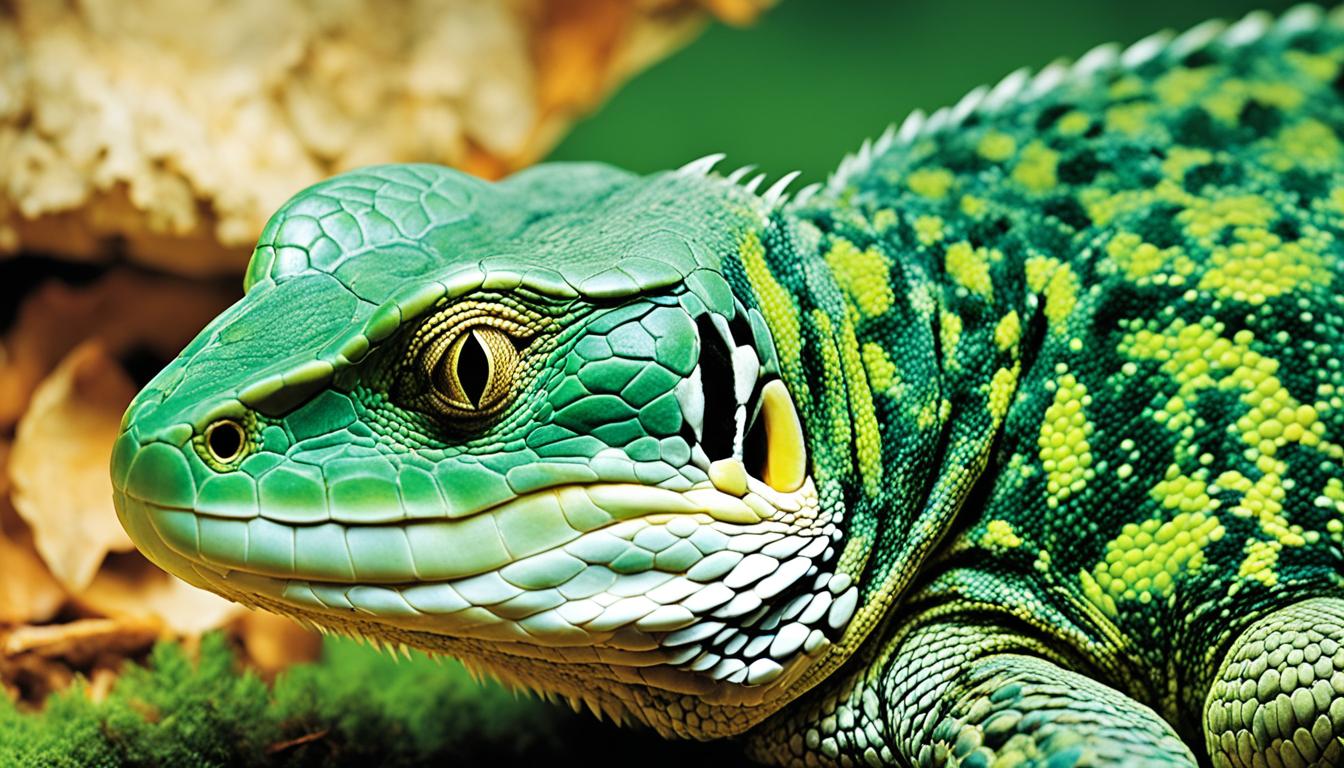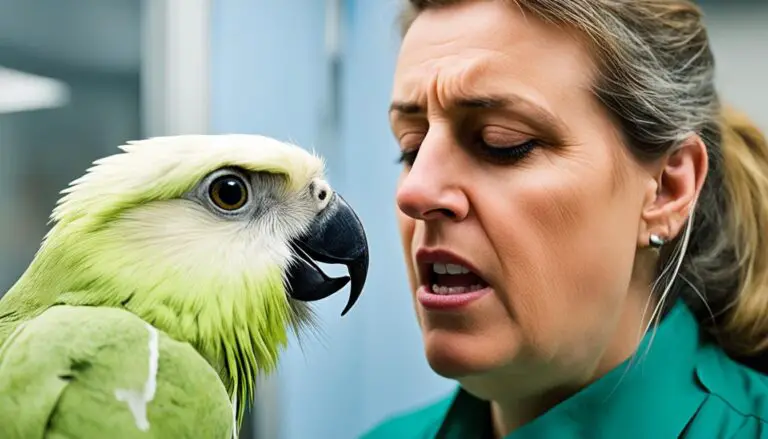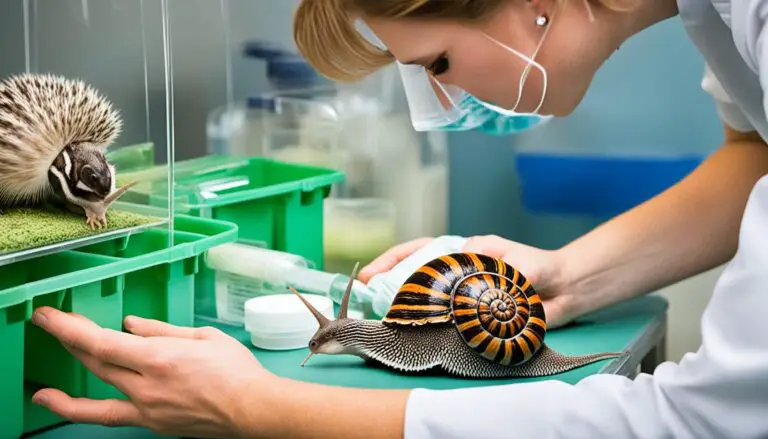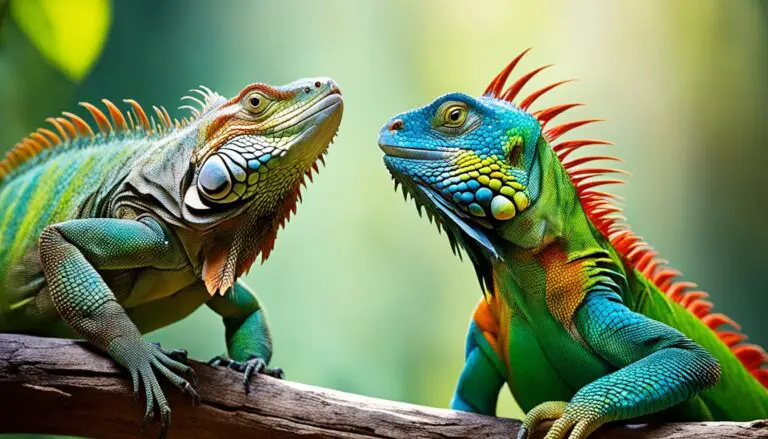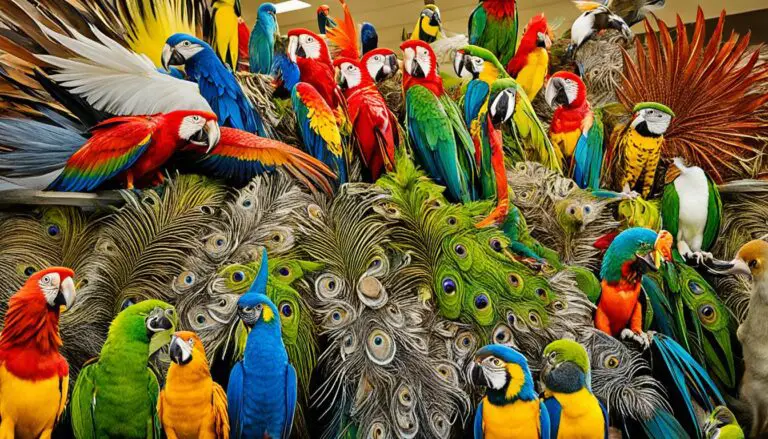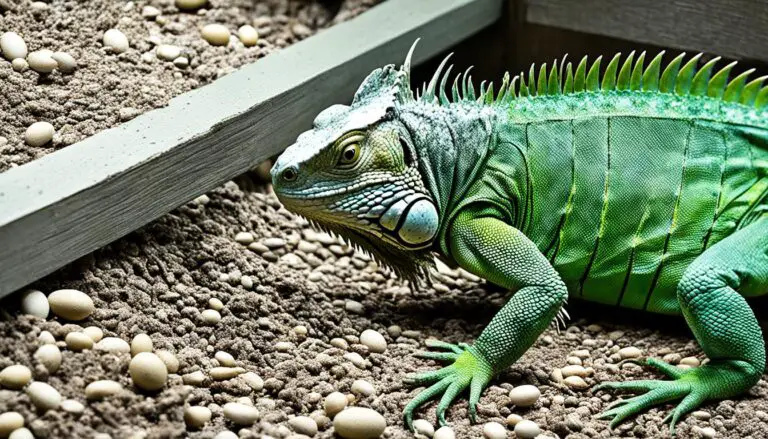Exotic Pet Respiratory Infections: Causes & Care
Exotic pet respiratory infections can pose a serious threat to the health and well-being of these unique animals. These infections are caused by various factors such as bacteria, viruses, fungi, or parasites, and can be life-threatening if not properly treated.
Proper care and attention from a veterinarian are crucial in managing respiratory infections in exotic pets. This includes recognizing the symptoms, maintaining proper husbandry, and seeking timely veterinary care.
Let’s explore the causes, symptoms, diagnosis, treatment, and prevention of respiratory infections in both reptiles and exotic companion mammals, and learn how to provide the best possible care for these beloved pets.
Causes of Respiratory Infections in Reptiles
Respiratory infections in reptiles can be caused by various factors. Poor husbandry, bacterial infections, viral infections, fungal infections, and parasitic infections are all common culprits. Reptiles with suboptimal living conditions are more susceptible to developing respiratory illnesses, making proper husbandry practices essential in preventing these infections.
Good reptile husbandry involves maintaining appropriate temperature, humidity, lighting, diet, and water quality. These factors play a crucial role in keeping reptiles healthy and minimizing the risk of respiratory infections. Bacterial respiratory diseases, viral respiratory conditions, fungal infections, and parasitic respiratory conditions are frequent causes of respiratory infections in reptiles.
“Proper husbandry practices are key in preventing respiratory infections in reptiles. By providing the right environmental conditions and ensuring good hygiene, pet owners can significantly reduce the risk of their reptiles developing respiratory illnesses.”
When it comes to treating respiratory infections in reptiles, veterinarian intervention is necessary. Proper diagnosis and treatment are essential to alleviate symptoms and prevent further complications. Regular veterinary check-ups for exotic pets are crucial in maintaining their respiratory health and overall well-being.
Common Causes of Respiratory Infections in Reptiles:
- Bacterial infections
- Viral infections
- Fungal infections
- Parasitic infections
In the next section, we will explore the symptoms and diagnosis of respiratory infections in reptiles, shedding light on how these conditions are identified and addressed.
Symptoms and Diagnosis of Respiratory Infections in Reptiles
Respiratory infections can have various symptoms in reptiles, making it important for pet owners to be observant of any changes in their behavior. Some common symptoms of respiratory infections in reptiles include:
- Nasal discharge
- Oral redness
- Increased respiratory rate
- Wheezing
- Weight loss
- Lethargy
Due to their ability to camouflage illnesses, reptiles may not always exhibit visible signs of respiratory infections. Therefore, it’s crucial for pet owners to closely monitor their reptiles and consult a veterinarian if they notice any abnormal behaviors or symptoms.
To diagnose respiratory infections in reptiles, veterinarians utilize a combination of diagnostic tools and techniques, which may include:
- A thorough history of the reptile’s health
- A comprehensive physical examination
- Radiographs (X-rays) to identify changes in lung tissues
- Blood work to assess overall health and detect any signs of infection
- PCR testing to identify specific pathogens
Radiographs and PCR testing play significant roles in diagnosing respiratory infections in reptiles:
Radiographs can help veterinarians visualize the reptile’s respiratory system and identify any abnormalities or lesions in the lung tissues.
PCR testing can detect and identify specific pathogens responsible for the respiratory infection, such as bacteria or viruses.
Through these diagnostic methods, veterinarians can determine the underlying cause of the respiratory infection and develop an appropriate treatment plan tailored to the reptile’s condition.

Risk Factors for Respiratory Infections in Reptiles
Proper husbandry and routine veterinary care play a crucial role in preventing respiratory infections in reptiles. Failing to provide suitable living conditions and neglecting regular check-ups are significant risk factors for these infections. Additionally, reptiles with weakened immune systems, such as the young, old, or immunocompromised individuals, are at an even higher risk of developing respiratory diseases. It is important to prioritize the health and well-being of exotic pets to reduce the likelihood of respiratory infections.
Stressed, sick, malnourished, or otherwise unhealthy reptiles are more vulnerable to acquiring respiratory infections. Therefore, it is essential to ensure that reptiles receive proper care, including a suitable environment, temperature regulation, hygienic living conditions, and a balanced diet. Regular veterinary check-ups, proper husbandry practices, and attention to the overall health of exotic pets are key for preventing respiratory infections in reptiles.
The Importance of Suitable Husbandry
Reptiles require specific environmental conditions to thrive and maintain a healthy respiratory system. The following table highlights some key elements of proper husbandry:
| Environmental Factor | Role in Preventing Respiratory Infections |
|---|---|
| Temperature | Maintaining appropriate temperatures helps reptiles regulate their metabolism and immune response, reducing the risk of respiratory infections. |
| Humidity | Providing the correct humidity levels is crucial for respiratory health, as inadequate or excessive humidity can lead to respiratory distress and infections. |
| Air Quality | Clean air, free from irritants and pathogens, is necessary to keep reptiles’ respiratory systems healthy and prevent infections. |
| Diet | A balanced and nutrient-rich diet supports reptiles’ overall health, including their immune function and respiratory system. |
Implementing these husbandry practices reduces the risk of respiratory infections in reptiles, ensuring they live healthier, happier lives as exotic pets.

Treatment of Respiratory Infections in Reptiles
The treatment of respiratory infections in reptiles is highly dependent on the underlying cause of the infection. Veterinarians with expertise in exotic pet care will carefully examine and diagnose the specific pathogen responsible for the infection before recommending a treatment plan. Depending on the situation, treatment options may include:
- Antibiotics: If a bacterial infection is detected, the veterinarian may prescribe antibiotics to target and eliminate the bacteria causing the respiratory infection.
- Antiparasitic Drugs: In cases where parasites are identified as the cause of the infection, antiparasitic drugs may be prescribed to eradicate the parasites and alleviate respiratory symptoms.
- Antifungal Medications: If a fungal infection is diagnosed, antifungal medications can be used to combat the fungal growth and restore respiratory health.
In addition to specific medication protocols, comprehensive treatment plans for reptiles with respiratory infections often include supportive care measures. These can involve:
- Fluid Therapy: Maintaining proper hydration is crucial for reptiles battling respiratory infections. Veterinarians may administer fluids via intravenous or subcutaneous routes to prevent dehydration.
- Heat Support: Reptiles rely on external heat sources for regulating their body temperature. Adequate heat support, such as providing suitable basking spots and maintaining optimal enclosure temperatures, helps reptiles recover and boosts their immune response.
- Improved Husbandry: Ensuring optimal husbandry practices, including appropriate temperature, humidity levels, and cleanliness, is paramount in preventing the recurrence of respiratory infections and promoting long-term respiratory health.
Veterinarians and pet owners must collaborate closely to determine the most effective treatment plan for respiratory infections in reptiles. Regular communication and follow-up visits are essential as the treatment progresses, allowing adjustments to be made when necessary and facilitating the reptile’s recovery.
Providing comprehensive care, timely veterinary treatment, and creating an optimal environment are key factors in successfully managing respiratory infections in reptiles. By addressing the root cause of the infection and implementing appropriate treatment measures, reptiles can regain their health and enjoy a better quality of life.
Recovery and Management of Respiratory Infections in Reptiles
Recovery from respiratory infections in reptiles can be a slow and gradual process, often taking several weeks or even months. However, with aggressive and prompt care, including veterinary treatment and supportive care, reptiles have the potential to fully recover from respiratory infections and regain their health.
During the recovery process, it is crucial for reptile owners to closely follow the veterinarian’s recommendations and provide the necessary care. This may involve administering medications, providing a warm and humid environment, and ensuring proper nutrition. Regular check-ups with the vet will help monitor the reptile’s progress and make any necessary adjustments to the treatment plan.
It is important to note that reptiles who have had respiratory infections are more prone to future recurrences. Therefore, ongoing management is necessary to prevent relapses and maintain their respiratory health. This may involve periodic veterinary screenings, ensuring proper husbandry practices, and addressing any underlying factors that may contribute to respiratory issues.
Reptile owners must be patient and committed to their pet’s long-term well-being throughout the recovery process. By working closely with their veterinarians and providing optimal care, they can help their reptiles fully recover and minimize the risk of future respiratory infections.

Key Points for Managing Respiratory Infections in Reptiles:
- Follow the veterinarian’s treatment plan and provide necessary medications and supportive care.
- Create a warm and humid environment to aid in the reptile’s recovery.
- Ensure proper nutrition to strengthen the reptile’s immune system.
- Attend regular check-ups to monitor progress and make any necessary adjustments to the treatment plan.
- Implement preventive measures to reduce the risk of future respiratory infections, including routine veterinary screenings and optimal husbandry practices.
Recovery and Management Table:
| Treatment | Benefits |
|---|---|
| Veterinary treatment | Effectively targets the specific pathogens causing the respiratory infection |
| Supportive care | Helps maintain the reptile’s strength and comfort throughout the recovery process |
| Optimal husbandry | Creates a conducive environment for healing and reduces the risk of future infections |
| Regular veterinary check-ups | Allows for monitoring of progress, adjustment of treatment plan, and early detection of any potential issues |
| Preventive measures | Minimizes the risk of future respiratory infections through routine screenings and proper husbandry |
Respiratory Infections in Exotic Companion Mammals
Respiratory infections can affect a wide range of exotic companion mammals, including rabbits, guinea pigs, chinchillas, ferrets, and rats. These infections can arise from various factors such as age, stress, improper environment, husbandry practices, and concurrent illnesses. When it comes to identifying respiratory infections in exotic mammals, pet owners should be aware of common clinical signs such as coughing, sneezing, nasal and ocular discharge, dyspnea, and increased respiratory effort.
Proper diagnosis is essential for effective treatment. Veterinarians typically conduct a thorough history, physical examination, and may utilize additional diagnostic tools such as radiography, culture/sensitivity testing, and in some cases, necropsy. These tests help determine the underlying cause of the respiratory infection and guide the appropriate treatment plan.
Diagnosis of Respiratory Infections in Exotic Companion Mammals
The diagnostic process for respiratory infections in exotic companion mammals involves the following:
- A thorough history: Gathering information about the pet’s environment, previous illnesses, and any changes in behavior or symptoms.
- Physical examination: Assessing the animal’s overall health, respiratory rate, lung sounds, and any visible abnormalities in the respiratory system.
- Radiography: Utilizing X-rays to visualize the respiratory system, identify any abnormalities, and assess the extent of the infection.
- Culture/sensitivity testing: Collecting samples from the respiratory tract to culture and identify the specific pathogens involved in the infection. Sensitivity testing helps determine the appropriate antimicrobial treatment.
- Necropsy: In some cases, when an exotic companion mammal succumbs to a respiratory infection, a post-mortem examination may be necessary to identify the cause and provide insights into potential complications.
It’s important to note that upper respiratory infections in exotic companion mammals generally carry a better prognosis than pneumonia cases.

Treatment and Prognosis for Respiratory Infections in Exotic Companion Mammals
The treatment of respiratory infections in exotic companion mammals involves a comprehensive approach that may include:
- Systemic antimicrobial therapy: Administering appropriate antibiotics based on the identified pathogens and their sensitivity.
- Nebulization: Utilizing nebulizers to deliver medication directly to the respiratory system, providing targeted treatment.
- Oxygen therapy: Supplemental oxygen support can aid in alleviating respiratory distress and promoting healing.
- Supportive care measures: Such as supplemental heat, ensuring a comfortable and conducive environment for the animal’s recovery.
The prognosis for respiratory infections in exotic companion mammals varies depending on the underlying cause and the severity of the infection. Upper respiratory infections typically have a better prognosis compared to pneumonia cases. Close monitoring, follow-up care, and continued improvement of husbandry practices are essential for successfully managing respiratory infections and ensuring the long-term health of these unique pets.
Etiology and Diagnosis of Respiratory Infections in Exotic Companion Mammals
Respiratory infections in exotic companion mammals can be caused by various pathogens, including bacteria, viruses, and sometimes fungi. The most common etiologies include gram-positive and gram-negative bacteria, Mycoplasma spp., Chlamydophila spp., and viruses. However, fungal infections are rare in these species.
Diagnosis of respiratory infections in exotic companion mammals is usually a comprehensive process that involves multiple methods. Along with thorough physical examination and medical history, culture/sensitivity testing, cytology, bacterial PCR, and necropsy can be utilized to determine the underlying cause of the infection. Additionally, radiography and CT scans may be employed to visualize the respiratory system and identify any lesions or abnormalities that may contribute to the infection.
Early and accurate diagnosis is crucial for appropriate treatment and management of respiratory infections in exotic companion mammals, as different pathogens may require specific treatment approaches. By identifying the causative agent, veterinarians can better tailor the treatment plan to the individual animal’s needs.
Different Diagnostic Methods for Respiratory Infections in Exotic Companion Mammals:
- Culture/sensitivity testing: This involves collecting samples from the affected areas, such as nasal swabs or tracheal washes, and growing them in a laboratory culture. The resulting growth is then tested for susceptibility to various antibiotics to determine the most effective treatment.
- Cytology: By examining samples obtained through swabs, aspiration, or biopsies, veterinary professionals can analyze the cells for any morphological changes or specific features indicative of certain pathogens or inflammatory responses.
- Bacterial PCR: Polymerase chain reaction (PCR) testing detects the presence of specific bacterial DNA or RNA, aiding in the identification and differentiation of different bacterial species. This technique is particularly useful when bacterial culture is not feasible or when prompt diagnosis is required.
- Necropsy: In some cases, when an exotic companion mammal succumbs to a respiratory infection, post-mortem examination can provide valuable insights into the cause of death and help identify the infecting agent.
Using a combination of these diagnostic methods, veterinarians can accurately diagnose respiratory infections in exotic companion mammals and determine the most appropriate treatment plan.
| Pathogen | Common Etiology |
|---|---|
| Gram-positive bacteria | Streptococcus spp., Staphylococcus spp. |
| Gram-negative bacteria | Pseudomonas spp., Bordetella spp. |
| Mycoplasma spp. | Mycoplasma pulmonis |
| Chlamydophila spp. | Chlamydophila psittaci |
| Viruses | Herpesvirus, picornavirus |
Treatment and Prognosis for Respiratory Infections in Exotic Companion Mammals
In order to effectively manage respiratory infections in exotic companion mammals, a combination of treatment options and supportive care measures is often necessary. The goal is to alleviate symptoms, eliminate the underlying infection, and promote the healing process.
Treatment Options
Systemic Antimicrobial Therapy: This involves the use of antibiotics or other antimicrobial medications to target the specific pathogens causing the respiratory infection. The choice of antibiotics depends on the suspected pathogens and their sensitivity to certain medications.
Nebulization: Nebulization is a technique that delivers medication directly to the respiratory tract, helping to reduce inflammation, relieve congestion, and promote healing.
Oxygen Therapy: Oxygen therapy may be necessary in cases where the pet is experiencing severe respiratory distress. It helps to improve oxygen levels in the body and support the healing process.
Supplemental Heat: Maintaining appropriate body temperature is crucial for the recovery of exotic companion mammals with respiratory infections. Supplemental heat sources, such as heat lamps or heating pads, may be used to provide comfort and promote healing.
Prognosis
The prognosis for respiratory infections in exotic companion mammals varies depending on the underlying cause and the severity of the disease. Generally, upper respiratory diseases have a better prognosis compared to pneumonia or lower respiratory tract infections.
Early detection, prompt veterinary intervention, and diligent adherence to the prescribed treatment plan are essential for a successful outcome. Close monitoring of the pet’s condition and regular follow-up care with the veterinarian are important for managing respiratory infections in exotic companion mammals and ensuring long-term health.
| Treatment Options | Prognosis |
|---|---|
| Systemic Antimicrobial Therapy | Varies depending on the cause and severity |
| Nebulization | Favorable with proper administration |
| Oxygen Therapy | Improvement in respiratory distress |
| Supplemental Heat | Aids in maintaining body temperature |
Conclusion
In conclusion, respiratory infections are a common issue in exotic pets, and they can be caused by various factors such as bacteria, viruses, fungi, or parasites. Proper husbandry practices, including maintaining appropriate temperature, humidity, diet, and hygiene, play a crucial role in preventing respiratory infections in exotic pets. Regular veterinary check-ups and timely treatment are essential for managing and treating these infections.
By working closely with their veterinarians, pet owners can ensure the best care for their exotic pets and create a conducive environment for their recovery and long-term health. It is important to remember that these unique pets require specialized attention and care.
Taking proactive measures, such as providing a suitable habitat, monitoring respiratory symptoms, and seeking veterinary care at the first sign of illness, can greatly improve the prognosis for exotic pets with respiratory infections. Prioritizing their health and well-being will help ensure a happy and healthy life for these extraordinary companions.
FAQ
What causes respiratory infections in exotic pets?
What are the symptoms of respiratory infections in reptiles?
How are respiratory infections in reptiles diagnosed?
What are the risk factors for respiratory infections in reptiles?
How are respiratory infections in reptiles treated?
What is the recovery process for reptiles with respiratory infections?
What causes respiratory infections in exotic companion mammals?
How are respiratory infections in exotic companion mammals diagnosed?
What is the treatment and prognosis for respiratory infections in exotic companion mammals?
How can respiratory infections in exotic pets be prevented?
Source Links
- https://www.petmd.com/reptile/conditions/respiratory/respiratory-infections-reptiles
- https://wpvet.com/reptile-rounds/respiratory-infections/
- https://www.vin.com/apputil/content/defaultadv1.aspx?pId=25844&catId=150705&id=9768917&ind=25&objTypeID=17
Peter Stones is the founder of Exotic Pets Place, the leading online resource for exotic pet care information.
With over 10 years of hands-on exotic pet ownership experience, he is deeply passionate about sharing his expertise to help others properly care for their unusual pets.
When he's not writing extensively researched articles or connecting with fellow exotic pet enthusiasts worldwide, you can find Peter at home tending to his own beloved menagerie of exotic animals.

